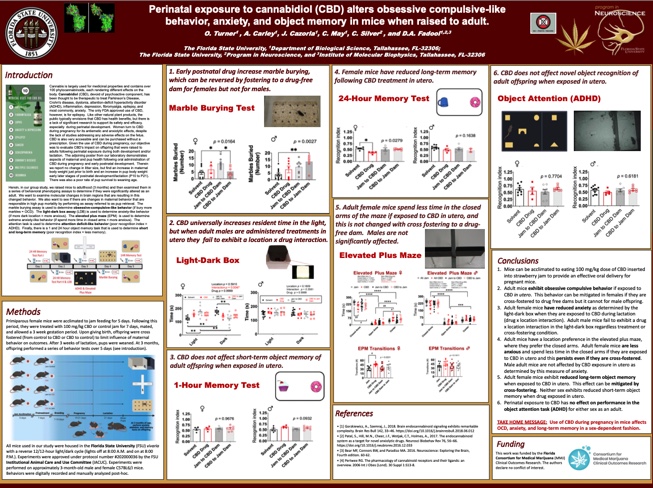Research Symposium
23rd annual Undergraduate Research Symposium, April 6, 2023
Olivia Turner Poster Session 3: 2:45 pm - 3:45 pm/ Poster #286
BIO
My name is Olivia Turner, and I am a second year undergraduate student. I am from Williamsport, Pennsylvania and am interested in pursuing a career in healthcare after graduating. From a young age, I have had an innate passion for science, medicine, and being of service to others. To that end, I began doing research in Dr. Debra Fadool's Molecular Biophysics and Neuroscience lab in the Fall of 2022 as a Directed Individual Study (DIS) student. The primary focus of our study is to determine the impact cannabidiol (CBD) has on an offspring following oral consumption of CBD during pregnancy. Many women use CBD during pregnancy for anxiolytic and antiemetic effects, despite the lack of studies addressing any adverse effects on the fetus. Our research aims to close this gap in knowledge. I have presented our findings at several other conferences, including the Beta Beta Beta Honor Society Poster Competition in Tallahassee and the Florida Undergraduate Research Conference in Miami. Having the privilege to be a DIS student in Dr. Fadool's lab has fueled my devotion to science and research.
Perinatal exposure to cannabidiol (CBD) alters obsessive compulsive-like behavior, anxiety, and object memory in mice when raised to adult.
Authors: Olivia Turner, Dr. Debra FadoolStudent Major: Biological Science
Mentor: Dr. Debra Fadool
Mentor's Department: Biology Mentor's College: College of Arts and Sciences Co-Presenters:
Abstract
Cannabidiol (CBD) is a derivative from the plant Cannabis sativa that has gained commercial popularity to mitigate anxiety and stress. Twenty-five percent of sampled uterus tissue has been found to contain Cannabis products, which raises concerns regarding its safety and effectiveness. Herein, we developed an oral route of CBD administration for pregnant dams to mimic CBD products consumed as edibles. Primiparous female mice were trained to eat jam containing solvent or 100 mg/kg CBD daily for two weeks, mated, and allowed a 3-week gestation period. Once CBD or control dams gave birth, pups were cross fostered to dams of the opposite treatment to isolate the effect CBD exposure in utero vs. that of lactation. Daily oral administration was halted upon weaning. At 3 months, adult offspring were examined for obsessive-compulsive-like behavior (marble burying), anxiety-like behavior (light dark box; LDB), and object memory (1 hour or 24 hour). We report that adults exposed perinatally to CBD show increased marble burying (1-W ANOVA, p<0.05) . Interestingly, the enhanced obsessive-compulsive behavior attributed to in utero drug exposure could be reversed for female mice with cross fostering during lactation, whereas it could not in males. CBD universally increased resident time in the light compartment of a LDB, but adult male mice administered treatments in utero fail to exhibit a location preference. Short-term memory (1 hour) was not impacted by CBD regardless of development age, route, or sex, but female mice showed diminished long-term memory (24 hour) succeeding CBD exposure in utero and lactation (p<0.01279).
Keywords: Cannabidiol, mice, behavior, pregnancy, neuroscience


